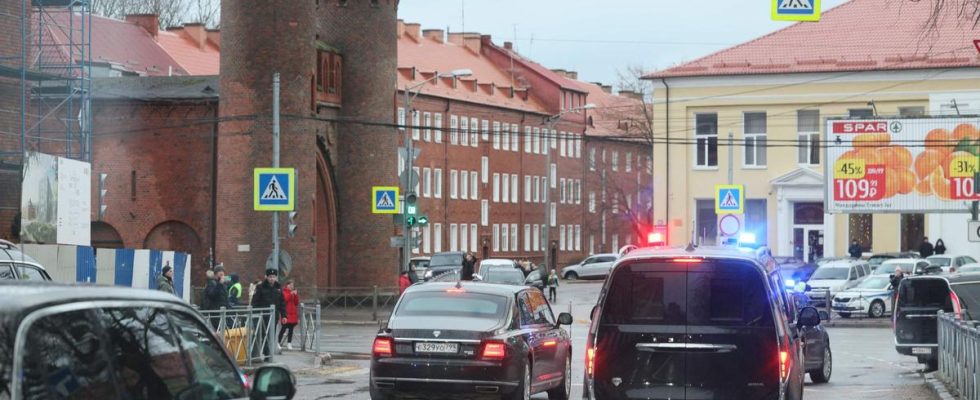The German philosopher from Königsberg, capital of East Prussia, is responsible for the international chaos, said Friday the elected leader of this region which is today a Russian enclave.
His judgment is imperative and categorical. “I want to show that Immanuel Kant, born here almost 300 years ago, has an almost direct link with global chaos […] that we face today. In addition, it has a direct link with the military conflict in Ukraine.said the governor of Kaliningrad, Anton Alikhanov, on Friday, translated by several Russian media, including Moscow Times or Meduza. The political leader spoke during the “Vth Congress of Political Scientists”, which opened in Svetlogorsk, a coastal city on the Baltic Sea belonging to the same Russian enclave, separated from the rest of Russia by the Baltic States. Depending on the mood, the affirmation, a priori and without concept, can make a philosopher smile or choke up.
But a geographer will see it as a sign of an old grudge. Immanuel Kant, as Alikhanov himself notes, was born in Kaliningrad in 1724 and died in this same city then called Königsberg in 1804. Because, at the time, this enclave was not Russian, but constituted the eastern slope of Prussia, a region fortified by the Teutonic knights from the 13th century. It was only in 1945 that the Red Army conquered this territory which the USSR annexed. If we followed the reasoning held by Vladimir Putin during his interview with Tucker Carlsonthe Russian character of the Kaliningrad enclave, where the population was overwhelmingly Prussian until the end of the Second World War, could be judged “artificial”as he says about Ukraine.
“The idea of the United Nations is his”
Returning to Kantian philosophy, Anton Alikhanov then justifies his confusing accusation. Inasmuch as “one of the founding fathers of the modern West”Immanuel Kant “laid the foundations of classical German philosophy”characterized by “impiety and the absence of higher values”. And the politician quotes The Critique of Pure Reason And Foundations of the metaphysics of morals.
Ontology, morality then politics. “Today, in 2024, we are bold enough to assert that not only did the First World War begin with Kant’s work, but so did the current conflict in Ukraine.”, assures Anton Alikhanov. Seen from the West, Immanuel Kant “is the father of almost everything. He is the father of freedom, of the idea of the rule of law, of liberalism, of rationalism and even of the idea of the European Union. Some even say that the idea of the United Nations is his.continues the governor, who cites Towards perpetual peace (1795). He could probably also have mentioned Idea of a universal history from a cosmopolitical point of view (1784).
That Kant imagined that it existed “a design of nature in the insane course of human things” and one “guiding thread of reason” despite the “disappointing coincidence” observable through historical events, of course. That Kant thought a “extended community” in which the rule of law would lead precisely to a “perpetual peace”, certainly. That he drew the outlines of a League of Nations as a “regulating horizon” for States trying to progress along the path of reason, despite the“unsociable sociability” men, certainly. That our world has retained a part of the Kantian ideal, without a doubt. And maybe so much the better?
Read also“They want to return to their historic homeland”: when Putin talks about the “rights” of the Hungarian minority in Ukraine
Let this universalist claim be judged today “imperialist” here or there, probably too. But the war in Ukraine is certainly not Kantian. The Königsberg philosopher wrote in Towards perpetual peace that “the violation of law in one place on earth is felt everywhere”. We are a long way from that, in Ukraine or elsewhere. On the contrary, more than ever, in each region of the world, divergent and even conflicting narratives are emerging. Across space and even time, a truth in Königsberg becomes a lie in Kaliningrad, and vice versa.
The ground has nevertheless been fertile for a long time. In 2015, the philosopher’s birthplace in Kaliningrad was tagged, with this inscription : “Andouille”. A little short no doubt to bring down the author of the three Reviews from his pedestal. More seriously, in 2013, far away in Russia, in Rostov-on-Don in the south of the country, two men argued about Immanuel Kant. They ended up shooting each other. “During the fight, the suspect pulled out a gun with rubber bullets and fired several shots at his opponent”told the Russian agency Ria Novosti. Perpetual peace definitely does not accompany the well-deserved rest of Immanuel Kant.

